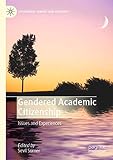Gendered Academic Citizenship [electronic resource] : Issues and Experiences / edited by Sevil Sümer.
Material type: TextSeries: Citizenship, Gender and DiversityPublisher: Cham : Springer International Publishing : Imprint: Palgrave Macmillan, 2020Edition: 1st ed. 2020Description: XIX, 250 p. 5 illus. online resourceContent type: text Media type: computer Carrier type: online resourceISBN: 9783030526009Subject(s): Sociology | Gender identity in education | Citizenship—Sociological aspects | Gender Studies | Gender and Education | Sociology of CitizenshipAdditional physical formats: Printed edition:: No title; Printed edition:: No title; Printed edition:: No titleDDC classification: 305.3 LOC classification: HM401-1281Online resources: Click here to access online
TextSeries: Citizenship, Gender and DiversityPublisher: Cham : Springer International Publishing : Imprint: Palgrave Macmillan, 2020Edition: 1st ed. 2020Description: XIX, 250 p. 5 illus. online resourceContent type: text Media type: computer Carrier type: online resourceISBN: 9783030526009Subject(s): Sociology | Gender identity in education | Citizenship—Sociological aspects | Gender Studies | Gender and Education | Sociology of CitizenshipAdditional physical formats: Printed edition:: No title; Printed edition:: No title; Printed edition:: No titleDDC classification: 305.3 LOC classification: HM401-1281Online resources: Click here to access online 1. The Contours of Gendered Academic Citizenship Sümer, O’Connor and Le Feuvre -- 2. Accessing Academic Citizenship: Excellence or Micropolitical Practices? O’Connor -- 3. Probationary or Second-class Citizens? Postdoctoral Experiences in the Swiss Context Le Feuvre, Bataille, and Marie Sautier -- 4. Gender and Academic Citizenship Practices: The Norwegian Case Brandser and Sümer -- 5. Family, Career Progression and Gendered Academic Citizenship Tan, Sağlamer, Çağlayan -- 6. Changing Institutional Policies and Gender Equality Challenges: The Hungarian Case Judit Lannert and Beáta Nagy -- 7 Sexual Harassment in Turkish Academia through the Lens of Gendered Academic Citizenship Ecevit and Beşpınar -- 8. Conclusions: Gendered Academic Citizenship as a Promising Agenda Sümer, O’Connor and Le Feuvre.
This book proposes the framework of gendered academic citizenship to capture the multidimensional and complex dynamics of power relations and everyday practices in the contemporary context of academic capitalism. The book proposes an innovative definition of academic citizenship as involving three key components: membership, recognition and belonging. Based on new empirical data, it identifies four ideal-types of academic citizenship: full, limited, transitional citizenship and non-citizenship. The different chapters of the book provide comprehensive reviews of the relevant research literature and offer original insights into the patterns of gender inequalities and practices of gendered academic citizenship across and within different national contexts. The book concludes by setting a comprehensive research agenda for the future. This book will be of interest to academic researchers and students at all the levels in the disciplines of sociology, gender studies, higher education, political science and cultural anthropology.
